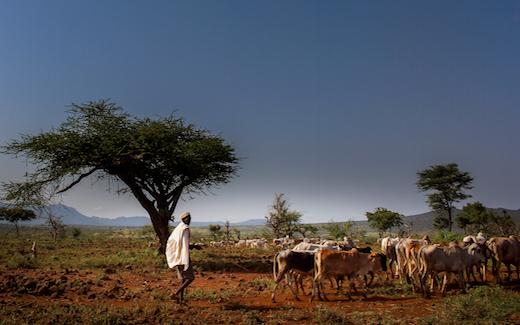Building and applying the livestock evidence base
SEBI seeks to build the livestock evidence base and close critical data gaps. We do this by assembling, analysing and collating new and existing data to produce new evidence that can support better decision-making.
In Low and Middle-Income countries, essential livestock data is disparate, scarce and hard to access. As a consequence, policy makers and development funders lack important information to guide livestock investments and to target their interventions. As well, researchers may not be aware of what data and evidence is already available, leading to overlaps, inefficiencies, and data gaps.
To address this, we seek to build the livestock evidence base and close critical data gaps. We do this by assembling, analysing and collating new and existing data to produce new evidence that can support better decision-making. We take a lead in exploring new and innovative ways addressing data gaps, through partnerships with private sector and innovators in the field. We are exploring emerging technologies to generate data, for example the Internet of Things (IoT), synthetic data, machine learning and natural language processing.
Evidence-based interventions to reduce livestock mortality and reproduction losses in Ethiopia, Nigeria and Tanzania
SEBI and partners are working to establish baselines for livestock mortality, reproduction losses and their causes in order to identify interventions that will achieve the target mortality reductions in cattle and small ruminants. We do this by confirming and building upon available data.

In detail, the approach includes
- Determine the national mortality rates for cattle and small ruminants (key indicator for BMGF)
- Establish the main causes of mortality and reproduction losses
- Perform interventions to address the major identified causes of mortality and reproduction losses
- Establish the route to achieving the goal of 10-15% mortality reduction using modelling methodology
- Encourage and support animal health companies to enter neglected animal health markets, by demonstrating potential return on investment (RoI) to farmers and companies.
Current partners in this project
- University of Glasgow (Tanzania)
- International Livestock Research Institute - ILRI (Ethiopia)
- University of Ilorin (Nigeria)
- Excelvets, Belgium
- Scotland’s Rural College (SRUC)
Read more about this work:
- Better data on livestock disease may unlock Nigeria’s dairy dilemma
- New study uncovers source of mystery neurological disease devastating Tanzanian sheep and goats
- An evidence-based approach for improving young livestock health in Ethiopia
Systematic evidence maps on livestock disease
We bring together hard-to-find evidence on livestock diseases, using our technical knowledge of data, veterinary expertise, and innovative methodology for systematic maps. The findings, initially from sub-Saharan Africa, will be presented using an interactive online visualization tool, showing which diseases are prevalent, and where. This accessible, intuitive, and easy-to-use tool can assist decision makers and investors to better target interventions, and can help researchers to identify areas for further investigation.
We will share our findings with the wider LD4D community and challenge them to react to our work and present their own solutions to data challenges. All data will be made open access and shared via livestockdata.org (launching later in 2020).
Monitoring, Evaluating & Learning in livestock interventions
Livestock development funders need evidence on the impact of their existing investments, and to help them identify where to invest next. Starting with the Bill and Melinda Gates Foundation, we work with funders and their grantees to understand the impacts of their livestock projects by exploring project data. We clean, coordinate and report on grantee data, collect secondary supporting data, report progress against key indicators and provide tailored insights.
We also work closely with grantees to develop a standard way of collecting and communicating data in order to effectively demonstrate impact. We will link grantees with the LD4D community to refine methods and approaches, enable peer-to-peer learning, review data quality, and share new evidence.
All non-commercially sensitive outputs and guidance materials will be made open access via livestockdata.org (launching later in 2020).
Livestock project portal
Funders and project implementers often struggle to know who is working on livestock development projects in low and middle-income countries. Ongoing initiatives may benefit from more interaction with government agencies, and may generate data that remains an untapped and potentially valuable resource for official decision-makers.
Responding to this challenge, we are developing an interactive and searchable web-based tool showing past and present livestock projects, starting with those supported by the Bill and Melinda Gates Foundation. The data portal allows funders, project implementers and national governments to access key information on livestock projects: where they are, what they are about, and what data they possess, and can be updated to reflect new activities. The goal is to support improved coordination and efficiency in livestock investments and interventions.
Our technical expertise in data management and our deep knowledge of the livestock sector allows us to effectively document and map projects.
The portal will be integrated with livestockdata.org and made openly accessible as a global public good. This tool will be shared with the LD4D community of practice, who will help review and refine its contents.
Livestock fact check
The Livestock Fact Check project digs into the evidence behind popular facts about livestock, to discover whether those facts are accurate and up to date.
The objective of this effort is to help ensure that facts relevant to the livestock sector are robust, up-to- date and appropriately interpreted, resulting in better-informed discussions around these topics.
To date, eight facts have been investigated and launched in a way that stimulates discussion on these issues. All factsheets are reviewed by members of the Livestock Data for Decisions (LD4D) community of practice
Additional key facts will be identified and reviewed in the future.

